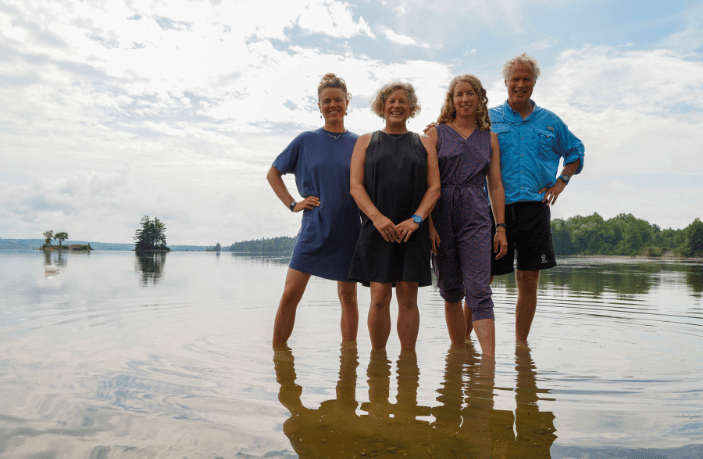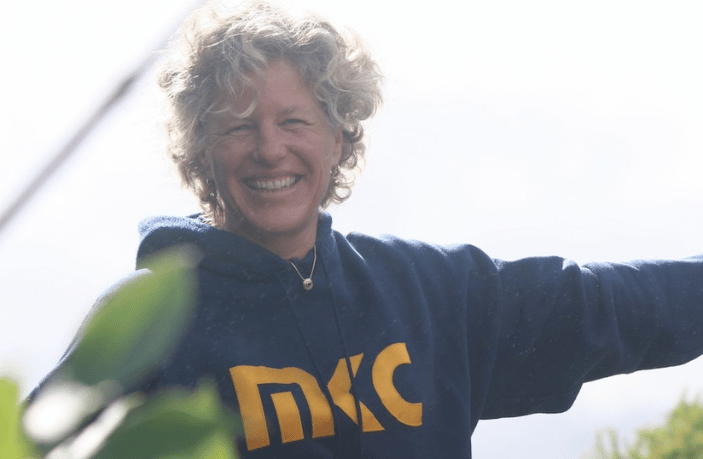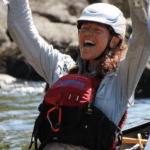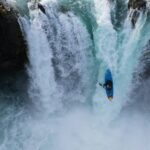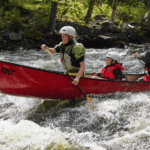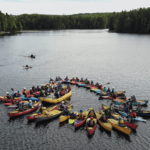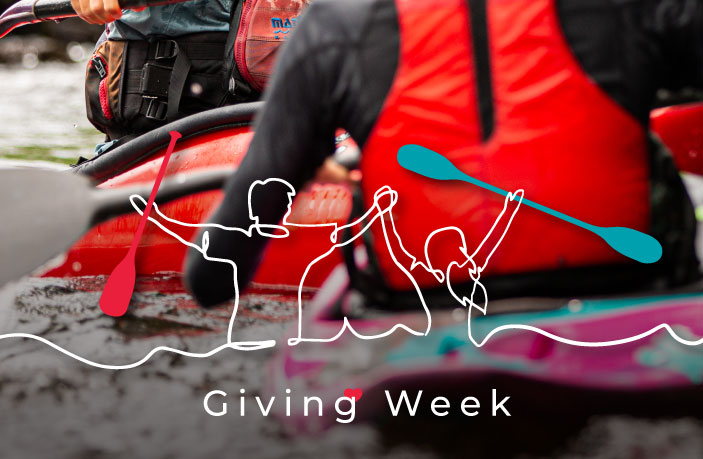We recently spoke with Claudia Van Wijk, a pivotal figure in the Madawaska Kanu Centre’s(MKC) evolution. From her childhood by the Madawaska River to shaping this iconic Canadian wilderness resort, Claudia’s story is both inspiring and insightful. In our interview, she shares her fond memories of MKC’s early days, her passion for kayaking and canoeing, and the core values she’s maintained from her parents’ era. Claudia also discusses MKC’s growth, the challenges faced, and the transition of leadership to her daughter Stefi, along with the new ideas Stefi has brought. Join us to learn what makes MKC special and gain insights into Claudia’s journey and the lessons she’s learned.
How would you describe your early days?
My younger sisters and I discovered the Madawaska River together and embraced kayaking as a family adventure. Our journey began with our parents, who immigrated from Germany. My mom, initially mistaking her pregnancy for seasickness during their voyage to Canada, found herself starting a new chapter earlier than planned. While working as a chartered accountant at Honeywell Securities, she met an Austrian colleague passionate about kayaking. At the same time, my father connected with the sport through an Austrian in his Toronto rooming house, leading him to the Ontario Voyageur Kayak Club. This serendipitous series of events introduced both of my parents to the world of whitewater paddling, and soon enough, we were immersed in the adventure of the Madawaska River.
As we grew, my sister Annette, who is four years younger than me, took on a significant role by running the MKC office when our parents transitioned to OWL Rafting in 1983. Meanwhile, my youngest sister Ina, who is thirteen years younger than me, became a top Canadian slalom paddler, winning a bronze team medal at the Junior Worlds. It’s not a coincidence that our family has produced such strong women, each contributing their unique strengths to our shared passion for kayaking and adventure.
What is a fond memory you have about your parents building Madawaska Kanu Centre?
One of my earliest memories is kayaking in a folding Klepper boat, which we assembled using a skeleton and canvas. By age three, I was already navigating rapids with my father in a double-seater, while my mother was equally passionate about kayaking. Our school years were unconventional; each June, my younger sister, Annette and I would travel with our parents in a VW van, completing homework while they competed in whitewater events across North America. We journeyed to the West Coast of British Columbia, as well as Idaho and Colorado over three summers, transforming those months into our unique version of school.
In 1968, after winning the Canadian championships, my parents dreamed of sharing their love for kayaking and founded the Madawaska Kanu Centre. They scouted various locations before settling on the Madawaska River, which offered the ideal rapids and water flow. This decision was facilitated by a partnership with Ontario Hydro, which guaranteed a steady water flow through a formula still in use today. My parents chose a site based on the river’s intermediate rapids, known today as Chalet Rapids, and secured ten acres of crown land for the centre. They deliberately avoided developing the river’s edge to preserve its wilderness, a decision that has kept the area pristine and undeveloped. I recall helping clear the land with a machete and locating water using (dowsing) witching sticks, an adventure that made building MKC feel truly special. Despite initial skepticism and criticism from the paddling community, MKC has flourished, and now, many of those same critics’ children come to learn at our centre, a testament to the enduring success of our parents’ vision.
Did you always enjoy water sports?
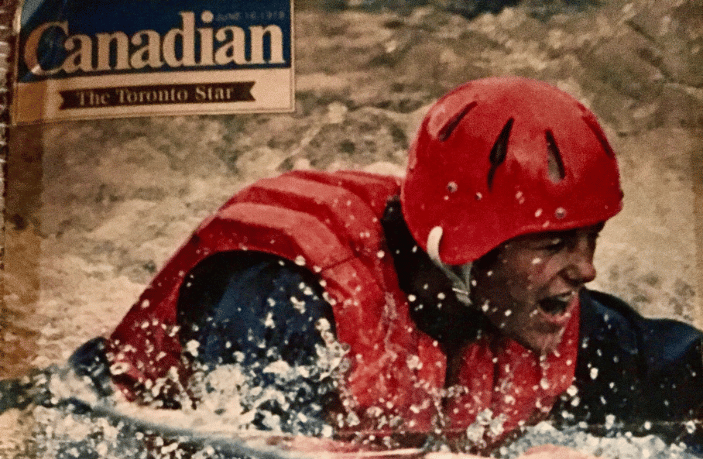
Growing up, my sister and I lived in a quick-paced world, constantly moving from one river to another as our parents competed. I was more interested in climbing trees and playing with dolls than in the sport itself, which seemed like an adult activity. It wasn’t until a decade later, when I took over the Madawaska Kanu Centre, that I fully appreciated the sport’s potential for younger audiences. I introduced a youth junior class, recognizing that kids learn best in a social environment. Initially an adult-only sport dominated by men, kayaking has since transformed, with kids picking it up quickly and women now frequently outnumbering men at MKC. It’s remarkable to see how the sport has evolved and become more inclusive.
Why did you decide to continue your parents’ company?
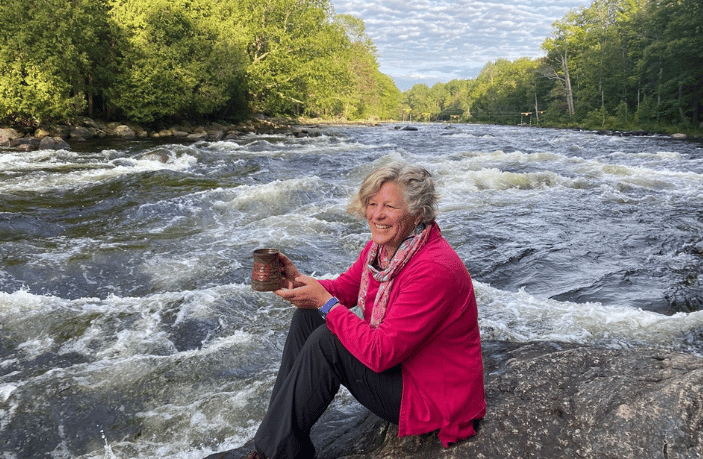
Despite being surrounded by kayaking from a young age, I initially found little interest in the sport. My passion lay in building and carving out the Madawaska Kanu Centre from the forest, where I loved working with my hands. This changed dramatically when our first young students arrived. I noticed their enthusiasm and thought, “If these boys are excited about kayaking, maybe I should be too.” The boys became my friends and that’s when I decided to start paddling.
Our early instructors were world-class paddlers, including Europeans my father, an Olympic competitor, had met. Their expertise was invaluable, and I quickly became proficient. By 1974, at just 13, I won the Canadian women’s title in kayak slalom, which ignited my genuine passion for the sport. That same year, I helped my parents at the Toronto Sportsman Show where we met the Lamothe brothers from the Ottawa River. Their invitation led to my first experience on the Ottawa’s impressive rapids and another victory in the Canadian Women’s title, a title I held for ten years.
In 1982, at 21, I took over managing the Madawaska Kanu Centre while my parents shifted their focus to OWL Rafting. My husband Dirk, a key player in our story, was instrumental in starting OWL Rafting. Dirk had been my boyfriend since my early competitive days and later became a crucial partner in both OWL Rafting and the growth of MKC. His leadership helped OWL Rafting expand rapidly, but my parents eventually decided to sell both OWL and MKC together – to us.
Balancing responsibilities between OWL and MKC while raising my children, Katrina and Stefi, was demanding. Dirk and I made it work, with me focusing on MKC during the week and helping at OWL on weekends. My children grew up immersed in this world, and it’s incredibly fulfilling to see them, now the third generation, continuing our family’s legacy. It’s a dream come true to witness them passionately carrying on the work that started with my parents.
How has Madawaska Kanu Centre evolved over the years?
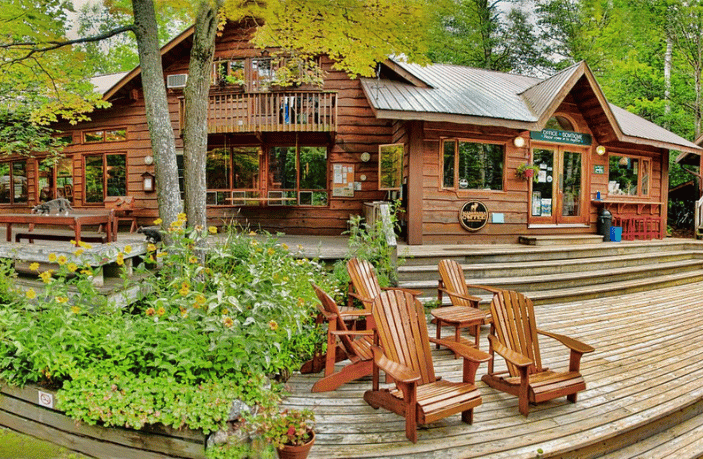
Initially, the Madawaska Kanu Centre was solely focused on competitive kayaking. However, my parents quickly realized that the market for competitive kayakers was limited, and they needed to cater to beginners. This led to the creation of the popular five-day course, which remains a core offering today. In just five days, participants progress from novice paddlers to confidently navigating class II and III whitewater, thanks to the river releases available Monday to Thursday and a river trip on Friday to round out the week.
In the mid-70s, the centre expanded to include open canoeing, a development sparked by innovative paddlers who adapted inner tubes for whitewater use. This era saw the evolution of canoe materials from aluminum to ABS plastic, and then to composite materials like Kevlar, which was originally used for bulletproof military use. The breakthrough came with the invention of the plastic kayak by the River Run Company, LPA Plastics in Drummondville, Quebec, making the sport more accessible and affordable, significantly expanding its reach.
The shift in technology also transformed open canoeing. Canoes evolved to handle whitewater similarly to kayaks, thanks to new materials that could absorb impacts without significant damage. Today, the Madawaska Kanu Centre is renowned worldwide for its open canoeing programs, with 55% of our students now choosing canoeing over kayaking. This shift reflects broader trends in the sport, where technology and inclusivity have changed the landscape. Despite these advancements, our commitment to teaching whitewater skills and showcasing Canada’s beautiful northern waterways remains steadfast.
What are some significant changes the whitewater school has gone through?
The landscape of outdoor education has evolved significantly with Stefi and Katrina’s leadership. Unlike my generation, which focused primarily on honing our whitewater paddling skills without formal teaching training, Stefi and Katrina have embraced the role of “outdoor educators.” In our early days, we created our own kayak instructor program and manuals, which we later shared with esteemed paddling organizations, Paddle Canada and Canoe Kayak Canada. Today, the sport has grown beyond its competitive roots, especially with its inclusion in the Olympics. The national organizations now provide advanced learning modules, enhancing our understanding of how people learn and the various learning styles. Consequently, our instructors are not just expert paddlers but also professional educators. This shift has markedly improved the quality of instruction at MKC, making our teaching approach more effective and inclusive.
What are significant challenges Madawaska Kanu Centre has faced over the years?
In 1997, we faced a major challenge when the reservoir, Bark Lake, didn’t fill up, snow sublimated with an unusually hot spring and lack of rain. The water level rose to 20 centimeters below the summer minimum, leading to frustration from the local community. Residents blamed Madawaska Kanu Centre for the low water levels, arguing that our water releases were unfair and even threatening to cut off our access to the lake.
This crisis demanded large entities to work together to build a solution. It was a matter of education for the community and the building of a partnership with Ontario Power Generation (OPG) and MNR, Ministry of Natural Resources. Every waterway has constraints both environmental as well as downstream utility needs that the public was unaware of. Sharing the resource, the water that flows downstream was a key factor in the development of the Madawaska River Management Plan, something I was invested in.
This plan, implemented in 2000 and reviewed every decade, has become law, ensuring that Bark Lake’s water levels and releases are meticulously monitored. The positive community response has been overwhelming, with locals often expressing their appreciation during springtime visits to town.
Beyond this, our biggest ongoing challenge is maintaining a supportive and sustainable community at MKC. The culture here is built on inclusivity, support, and personal growth. Our staff—whether instructors, kitchen staff, or raft guides—are integral to this atmosphere. We focus on creating a welcoming environment, where each guest is supported and encouraged, whether they’re easing into the sport or seeking new challenges.
In recent years, there’s been a growing recognition of the value of outdoor recreation, especially since COVID-19 highlighted its health benefits. This shift has helped improve our staff’s ability to pursue careers in outdoor education, adding to the richness of the MKC community and affirming our commitment to fostering lifelong connections and personal development.
How would you describe the culture and community?
Madawaska Kanu Centre (MKC) is celebrated for its inclusive and supportive environment, where every participant feels uplifted and valued. Our approach is rooted in personalized instruction—there’s no pressure to perform beyond your comfort level. We take the time to adapt our pace to each individual’s needs, whether you’re easing into the sport or ready for a greater challenge. Our small group sizes ensure tailored guidance, allowing us to teach and challenge you based on your unique skill level. At MKC, we believe in fostering a positive and encouraging atmosphere that promotes growth and confidence in every paddler.
How did it feel to hand over the company reins to your daughter, Stefi?
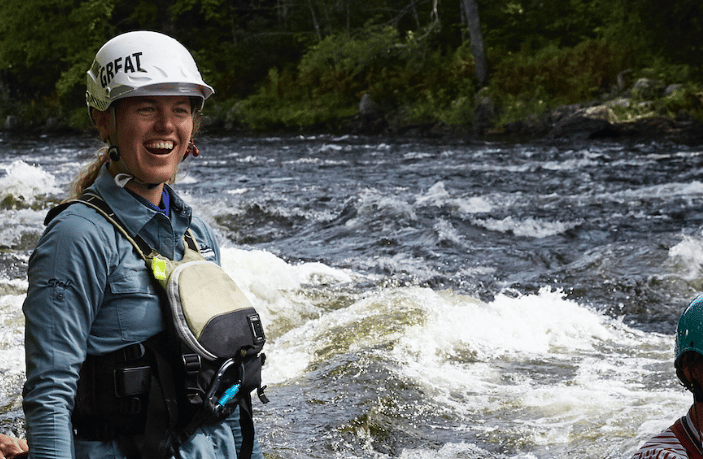
I still remember the day that things started to shift vividly—Stefi’s heartfelt words nearly brought me to tears. She came to me and said, “Mom, this is my future.” I was astonished, almost speechless. Stefi had spent much of her time away from MKC, exploring other avenues, while Katrina was deeply involved in the day-to-day operations from her teenage years onward. Stefi, on the other hand, had sought to carve out her own path.
But then, around seven years ago, she approached me with a sense of apprehension. “Mom, I’m scared,” she confessed. I asked her what she was afraid of, and she said, “I’m scared you’re not going to let go.” That moment was pivotal for me. I had been at the helm of this business for 40 years, and the thought of stepping aside was daunting. I knew I wanted to pass on the reins, but I was unsure how to do it effectively. I worried that Stefi might not grasp the full scope of the hard work and long hours involved, the challenges of handling people’s issues, and the sheer dedication required.
Realizing I needed support, I reached out to my friend, who was the head of HR at the Bank of Canada. I asked her to facilitate the transition process. She agreed enthusiastically and even suggested a more fitting facilitator, Katie Baker, who was ideally positioned to guide us. Katie worked with us for two years, navigating the complexities of the transition. The first year was particularly tough—Stefi and I had to confront and overcome numerous challenges. However, Stefi’s insight—that I had to allow her to fail in order for her to learn—proved transformative. By the second year, our dynamic had improved significantly.
One of the most important pieces of advice I’ve shared with Stefi and Katrina is to only grow what we can afford. This principle was instilled in me by my mother, a chartered accountant. Her lessons in business, coupled with my education, taught me the value of financial prudence. We conduct in-depth financial analyses three times a year: at the end of May, July 31st, and at our year-end in October. For example, this year, we noticed a 5% decrease in student meals served in May, but our food costs rose by 20%. Investigating revealed that we had bought more food locally, which, while supporting local businesses, was more expensive.
Stefi actively involves her team in these analyses, fostering a collaborative approach. This year, with a new kitchen team, she’s guiding them through the learning curve. We aim to stay on top of these financial details to ensure the health of the business, understanding that a thriving business supports both our guests and our staff.
Our commitment to healthy, non-processed food continues the tradition set by my mother, who was an exceptional cook. I’ve passed this passion on to our team, even reading cookbooks as bedtime stories. It’s gratifying to see our current team embracing these values.
When it comes to running a family business, involvement in the community is crucial. Stefi has embraced this by moving to Barry’s Bay, strengthening our local ties. We offer free rafting tours to local businesses, allowing them to experience our services and share their experiences with others.
Stefi and Katrina are now leading the charge in our industry. Katrina heads Canoe Kayak Canada’s kayak program, while Stefi focuses on local community engagement. I no longer attend all board meetings or travel extensively for training; they have taken on these roles, ensuring we remain at the forefront of our field.
Sustainability is another key focus. We believe in leaving nature better than we found it, and this philosophy extends to our operations and guest interactions. Our kitchen garden and the shared experience of raising and processing chickens—where even our vegan staff participated—highlight our commitment to understanding and respecting food sources.
These values—community involvement, financial responsibility, and sustainability—are the cornerstones of our legacy. Stefi and Katrina are not just continuing this legacy; they are enhancing it and making it their own.
How new ideas has Stefi brought to the table?
Stefi has brought a fresh wave of innovation to MKC, particularly in terms of inclusivity and work-life balance. It’s inspiring to see the strides she has made toward gender equality and her forward-thinking approach to leadership. Her vision has propelled MKC a decade ahead of where it might have been under my leadership alone.
One of the most impactful changes Stefi has implemented is her approach to staff management. While we still hold our weekly Monday night manager meetings—an established tradition—the way she engages with her team has evolved. Stefi dedicates more time to each core staff member and instructor, a luxury I didn’t have the capacity to provide as my responsibilities grew. This personal attention has fostered a more connected and motivated team.
Another significant change Stefi introduced is the practice of closing the center for one weekend each month. This idea, born out of the COVID-19 pandemic, was retained by Stefi for its positive impact on staff well-being. This regular break allows everyone to recharge, whether that means spending time together or simply relaxing. It’s a refreshing shift from my earlier focus on maximizing revenue, which often came at the expense of staff welfare.
Stefi’s ability to implement these changes is partly due to the financial stability of MKC. Unlike when my parents and I were building the business with substantial debt and financial pressure, Stefi and Katrina now manage MKC without a mortgage. This freedom has enabled Stefi to invest in initiatives that enhance the work environment and overall happiness of our staff. It’s a luxury that significantly benefits everyone involved.
What do you appreciate about the wilderness resort’s location?
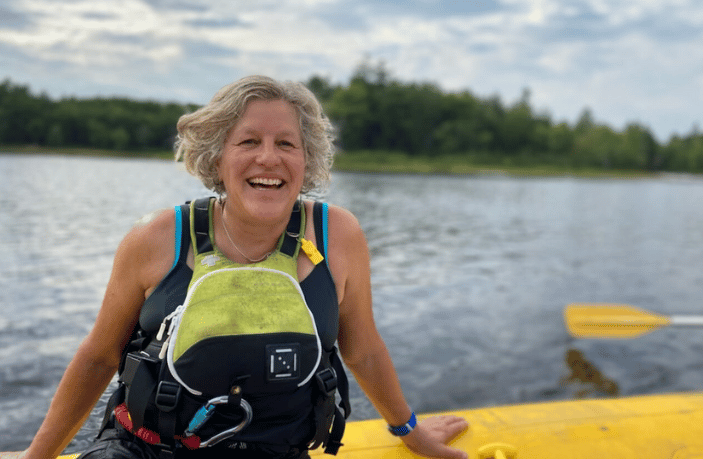
The location of MKC is truly a source of joy and tranquility for me. Whenever I drive down into the Madawaska River Valley and turn left onto River Road, a profound sense of happiness washes over me. It’s not just a location; it’s my happy place. I’ve met instructors who return after two decades, and they share the same sentiment—it’s a place that resonates deeply with those who have spent time here.
The natural beauty surrounding MKC is unparalleled. There’s no development along the river, and for miles—well, kilometers, really—we are surrounded only by trees. The forest is our neighbor, creating a pristine and healthy wilderness that is both breathtaking and calming.
Although the sunsets are not directly visible from our property, you can enjoy them riverside; uniquely the Middle Mad runs west to east thus both the sunrise and sunset can be enjoyed daily. These fleeting sun events are a special treat, adding to the charm of the location.
Our setting offers the best of both worlds: an immersive natural environment combined with proximity to a vibrant town, Barry’s Bay. The convenience of walking to essential places like the hardware store, pharmacy, bank, local ice cream shop, and Madawaska Coffee makes this small town delightful. This blend of serene nature and accessible amenities creates an exceptional experience for both staff and visitors. It’s a gem that many may not fully appreciate until they see it from afar, and that’s what makes it so special.
What sets Madawaska Kanu Centre apart?
What makes MKC truly unique and amazing is its ability to cater to all skill levels, making it perfect for any group, whether it’s a whole family or just a couple. Imagine coming with your entire family, where everyone—from the absolute beginner to the seasoned expert—can have an equally fulfilling and exciting experience. Whether you’re just starting out or you’re already a pro, MKC ensures that everyone can be challenged and grow at their own pace, all while sharing a memorable vacation together.
This inclusivity is what makes the experience so special and distinctly Canadian. There’s something quintessentially Canadian about being out on the water, paddling down a river in your own boat. It’s a celebration of our natural beauty and outdoor spirit, allowing you to embrace and enjoy the quintessential Canadian adventure, no matter your skill level.
What are some courses you have participated in, and what do you recommend?
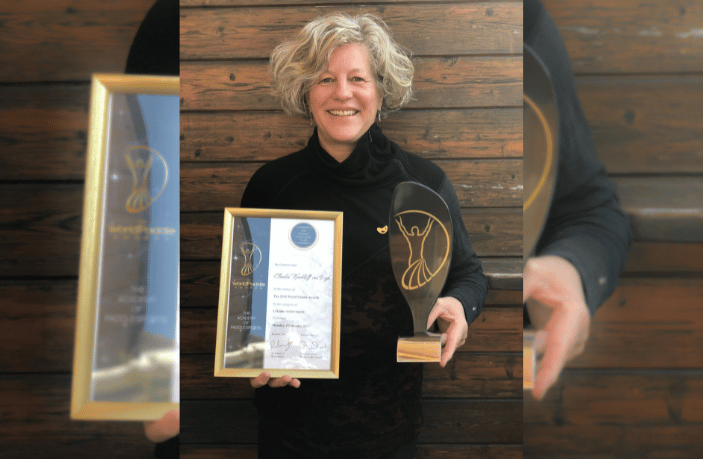
The five-day course at MKC is undoubtedly the best investment for mastering a new skill. It provides ample time to become proficient, which is crucial for learning the nuances of paddling. If you’re torn between kayaking and canoeing, I recommend starting with kayaking. It’s a faster boat, and being closer to the water helps you develop skills that are transferable to canoeing. If you begin with canoeing and later switch to kayaking, you’ll find yourself starting from scratch again, as kayaks are quicker to maneuver and offer a more immersive experience.
How did you meet Dirk, your husband and business partner?
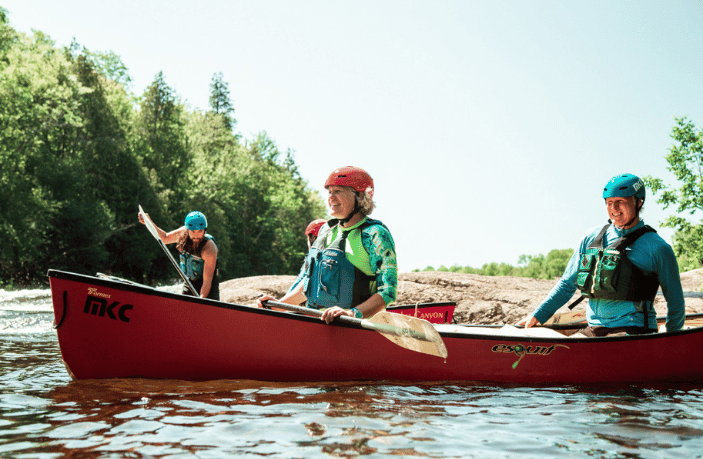
It’s quite the story. We crossed paths in an eddy on the Gull River in Minden, Ontario, during the Ontario Championships about 45 years ago. I was 18, and he was 20. At the time, he was known as the Canadian champion in cross-country skiing, and I was already a five-time Canadian champion in kayaking. My friend, who was also a cross-country ski racer, came running up to me and said, “Guess who’s here? Dirk Van Wijk, the Canadian champion in cross-country skiing.” Dirk was a novice kayaker then, while I had a bit more experience.
I paddled over to him and invited him to join me for a run. Our connection grew from there. Later, Dirk invited me on a Dumoine canoe trip where he was working as a guide for Black Feather, on Thanksgiving weekend. Dirk, though skilled in canoeing, was still new to kayaking. Coincidentally, I had applied only to universities in Ottawa because I wanted to skate to school. I got accepted to both Carleton and Ottawa U and chose Carleton for its whitewater opportunities. Dirk happened to be from Ottawa, great coincidence and everything fell into place perfectly.
Now that you are semi-retired, can you reflect on what you love most about being an entrepreneur?
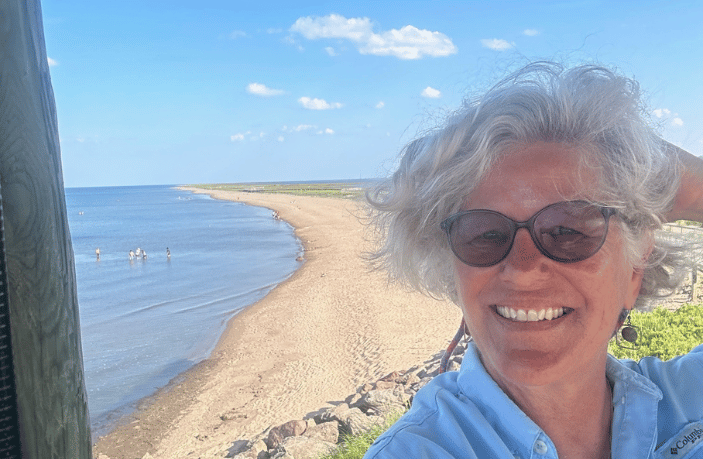
Inspiring others is a core aspect of entrepreneurship. Entrepreneurs have a knack for spotting opportunities and turning them into reality. The greatest joy comes from inspiring others, recognizing their potential, and helping them achieve it. I deeply cherish this aspect of my role, and now as a mentor, I have the opportunity to focus even more on it.
It’s also important to highlight that Katrina and Stefi are equal owners of the Madawaska Kanu Centre. Stefi serves as the director and oversees the on-site programs. Ownership doesn’t mean a diminished role; Stefi has significant influence and plays a crucial part in the center’s operations. Katrina and Stefi hold weekly meetings—both as sisters and as shareholders—where they make major decisions together, ensuring their collaborative vision shapes the future of MKC.
Final Notes
It was an absolute joy to sit down with Claudia and hear her remarkable story. She embodies the essence of a true visionary, seamlessly blending family values, cherished traditions, and innovative ideas to create a thriving business. Her journey is a testament to the power of merging the old with the new, resulting in something truly special and enduring.
Claudia’s deep love for the Madawaska River, the local community, whitewater adventures, and the unique experiences offered by MKC highlights what makes the center so exceptional. As she reflects on her journey and her passion for inspiring others, it’s evident that her warmth and dedication have not only shaped her own career but also set a wonderful example for future generations.
Claudia, we’re profoundly grateful for your hard work and the incredible impact you’ve made. We truly appreciate you!
